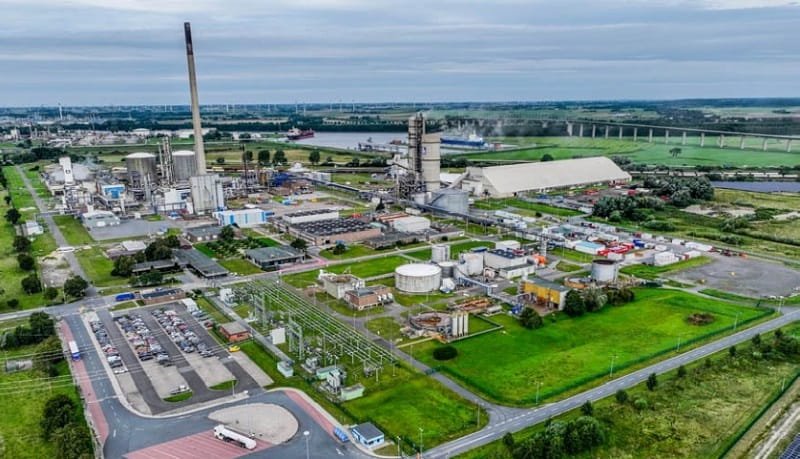Yara International officially opened its new ammonia import terminal in Brunsbüttel, Germany, a strategic location on the North Sea and Kiel Canal, poised to become a crucial hub for the burgeoning hydrogen economy in the region. This milestone was celebrated with representatives from both German and Norwegian authorities, showcasing the collaboration between the two nations in advancing low-carbon fuels initiatives.
The newly inaugurated terminal is a key component of Yara’s strategy to enhance its core nitrogen business while driving sustainable growth in a low-carbon future. With the capacity to import up to three million tonnes of low-emission ammonia annually, this facility is set to significantly impact the European hydrogen market.
Hans Olav Raen, CEO of Yara Clean Ammonia, said “As the world’s largest shipper and distributor of ammonia, Yara Clean Ammonia is in a pole position to secure low-emission ammonia supply to Germany at competitive prices. This initiative will help kick-start the German hydrogen economy, laying the groundwork for a net-zero future.”
The terminal’s capacity translates to approximately 530,000 tonnes of hydrogen, which is projected to represent around 5% of the total European hydrogen target for 2030. This substantial import capability underscores Yara’s commitment to supporting Germany’s energy transition and its hydrogen strategy.
Strategic Importance of Brunsbüttel
Yara’s new terminal in Brunsbüttel is uniquely positioned to play a pivotal role in enabling the hydrogen economy not only for Germany but for Europe as a whole.
The plant manager of Yara Brunsbüttel, Sven Kohnke, remarked, “For 50 years, we have been manufacturing products of fundamental importance to Germany and Europe here at the Brunsbüttel site. Today’s inauguration represents a new milestone and an important step towards a low-carbon future.”
The ammonia imported through this terminal can be delivered directly to points of use, where it can be cracked to produce low-emission hydrogen, essential for the decarbonization of various industries. The competitiveness of Germany’s industrial sector, particularly the steel and chemical industries, hinges on achieving significant emission reductions. Low-emission ammonia serves as a vital feedstock for this process, highlighting the terminal’s role in supplying the necessary quantities to meet industry demands.
The Promise of Low-Emission Ammonia
Low-emission ammonia can be produced through several methods, including electrolysis powered by renewable electricity and through carbon capture and storage (CCS) technologies. This versatility makes ammonia a highly attractive decarbonization product for hard-to-abate sectors. Besides its traditional use as a fertilizer, low-emission ammonia is emerging as a potential shipping fuel, a means of reducing emissions in refineries, and a carrier for hydrogen.
The demand for low-emission ammonia in Germany is anticipated to rise dramatically in the coming years. According to estimates from the Federal Ministry for Economic Affairs and Climate Protection, up to 70% of future national ammonia requirements will need to be imported by 2030. As the volumes are expected to increase further beyond this point, the Brunsbüttel terminal will be critical in meeting these future demands.
Strengthening Energy Partnerships
Yara’s initiatives in Germany are part of a broader energy partnership with Norway, a collaboration that plays a key role in the transition towards a low-carbon economy. In June, Yara also opened its renewable hydrogen pilot plant in Norway, which is recognized as the largest of its kind in Europe. This facility represents a significant advancement toward sustainable hydrogen production, further solidifying Yara’s leadership in the energy sector.
About Yara International
Founded in 1905 to combat famine in Europe, Yara has grown to become the world’s leading crop nutrition company and the largest provider of ammonia globally. With a workforce of 18,000 employees and operations spanning more than 60 countries, Yara is committed to sustainability as an integral aspect of its business model. In 2023, the company reported revenues of USD 15.5 billion.
Yara’s mission is to responsibly feed the world while protecting the planet. The company focuses on sustainable value growth by reducing emissions from crop nutrition production and developing low-emission energy solutions. By producing ammonia with significantly lower emissions, Yara aims to drive the green shift in fertilizer production, shipping, and other energy-intensive industries. Furthermore, the company is dedicated to providing digital tools for precision farming and collaborating with partners across the food value chain to promote more efficient and sustainable solutions.
The Brunsbüttel terminal is a testament to Yara’s commitment to unlocking low-carbon and renewable value chains while driving the development of clean ammonia as a hydrogen carrier globally. With its extensive global ammonia network—comprising 13 ships, access to 18 ammonia terminals, and multiple production and consumption sites—Yara is well-positioned to support the transition to a cleaner, more sustainable energy landscape in Europe and beyond.
Source Yara International

